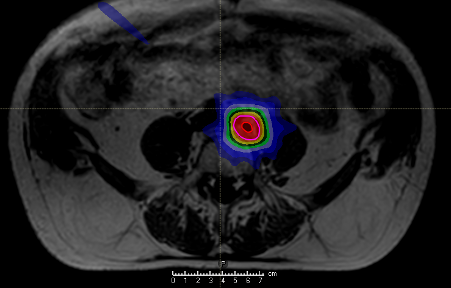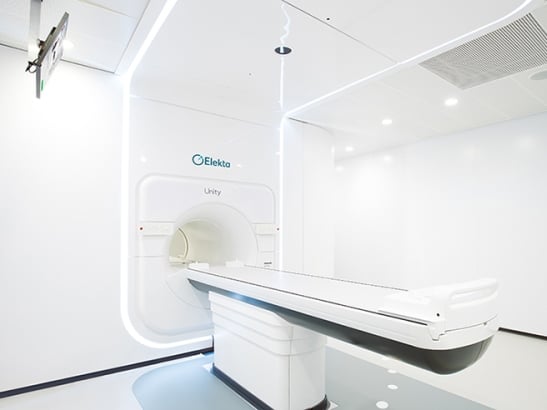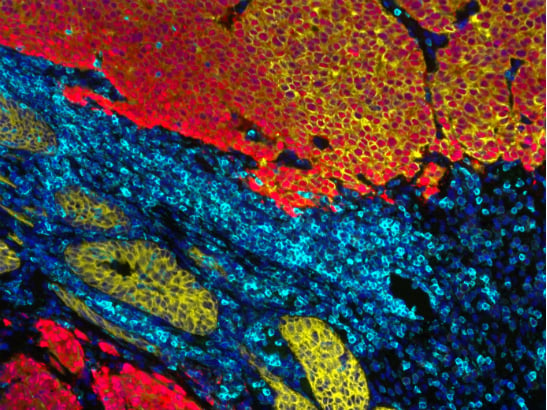Uro-oncology Clinical Trials Group
Dr Alison Tree’s group develops new precise radiotherapy techniques using simulations and real patient data, as well as with innovative clinical trials.
The development of increasingly precise and targeted radiotherapy has enabled us to ask new questions about the optimal management of cancer patients. Our research consists of three interwoven themes: hypofractionation in prostate cancer, radiotherapy for metastatic disease and combining treatments with ablative radiotherapy for mutual synergy.
Our research consists of three interwoven themes.
Hypofractionation in prostate cancer
- Using the MR Linac to deliver gold-standard image guided radiotherapy and to establish the benefits of this novel device
- Exploring the role of profound hypofractionation (SBRT in 5 fractions) in intermediate and high risk prostate cancer
- Dose-painting (putting the radiation dose where it has the optimal therapeutic ratio) in moderate and profound hypofractionation
- Exploring the limits of extreme hypofractionation
Radiotherapy for metastatic disease
- Can radiation be used as a systemic therapy in metastatic disease?
- Can radiation provide a method of ablating treatment resistant clones?
- Does irradiating pelvic lymph node microscopic metastases improve outcomes in prostate cancer?
Combining drug treatments with ablative radiotherapy for mutual synergy
- Immunotherapy and radiotherapy are synergistic and combining the two is likely to augment the response of each.
- Radiotherapy may be useful in targeting treatment resistant clones in castration-resistant prostate cancer, prolonging time on systemic therapy and delaying the need for chemotherapy.

The development of increasingly precise and targeted radiotherapy has enabled us to ask new questions about the optimal management of cancer patients. We now have the ability to ablate tissue as effectively as surgery, yet paradigms of treatment remain similar to decades ago.
Stereotactic body radiotherapy (SBRT), particularly in prostate cancer, allows us to ask questions about the limits of hypofractionation – can we cure cancer in a single radiotherapy treatment? To answer this bold question we need to develop more responsive ways of planning radiotherapy, including delivering radiotherapy to the anatomy of that day, rather than historic anatomy from two weeks ago. The MR Linac project is key to this, allowing us to see the tumour while we treat for the first time.
Clonal heterogeneity has implications for treatment resistance, particularly when part of a dynamic tumour system. Radiation has the advantage of being insensitive to genetic heterogeneity and could therefore be used to eradicate a treatment-resistant clone, prolonging the time a patient responds to their current line of systemic therapy.
Dr Alison Tree is a co-investigator in several national and international trials investigating SBRT and novel radiotherapy techniques, including PACE, CORE, InPACT and PIVOTALboost. This work is run collaboratively with academics across the UK, as well as colleagues within the ICR. Dr Tree is Prostate Tumour Site Lead for the MR Linac consortium and a collaborator in the ART-NET UK collaboration.
She is module leader and lecturer for the ICR MSc in Oncology, a member of The Royal Marsden NHS Foundation Trust/ICR Committee for Clinical Research and a member of the National Cancer Research Institute CTRad organisation which seeks to promote radiotherapy research in the UK.
Dr Alison Tree
Honorary Faculty:
Uro-oncology Clinical Trials
Dr Alison Tree is a clinical researcher investigating the benefits of profoundly hypofractionated radiotherapy in urological cancers. She is involved in several national and international trials of innovative radiotherapy strategies, and has a particular interest in prostate cancer.
Researchers in this group
Dr Alison Tree's group have written 155 publications
Most recent new publication 4/2025
See all their publicationsRecent discoveries from this group

 .
.

